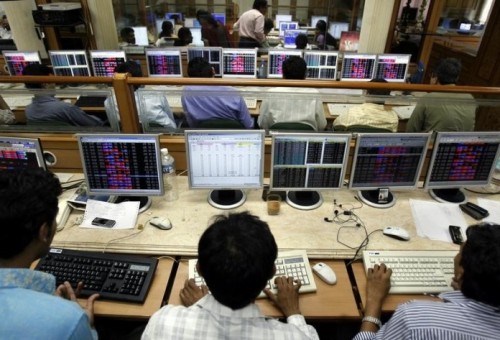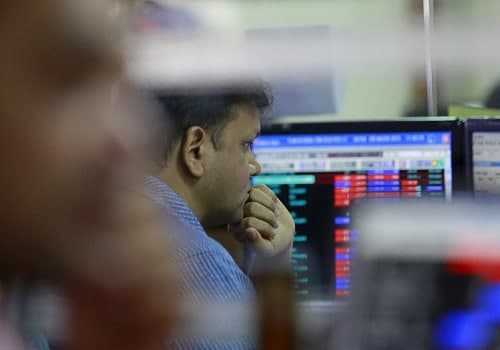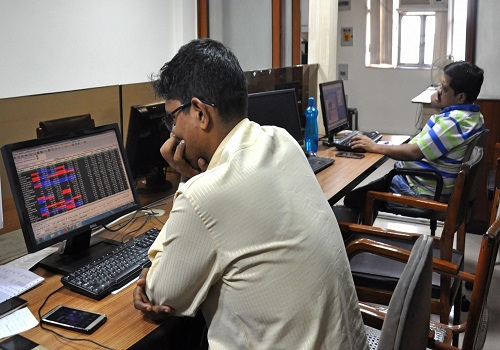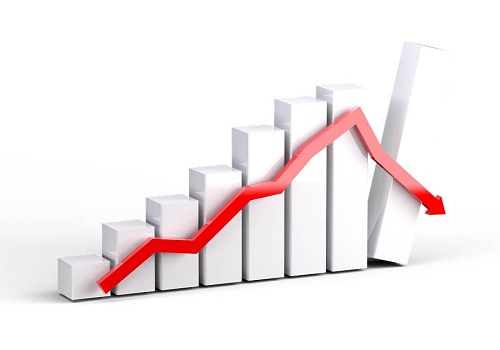Heavy selling drags Indian market lower on Monday

Follow us Now on Telegram ! Get daily 10 - 12 important updates on Business, Finance and Investment. Join our Telegram Channel
A heavy selling dragged Indian equity markets in red on Monday, with both Sensex and Nifty closing lower by over 1%. After a weak start, markets remained negative for the entire day, as weak economic data dampened the sentiments in the markets. The government data showed that the output of eight core infrastructure sectors grew 3.3 per cent in August -- the lowest in nine months -- as against 12.2 per cent in the year-ago period. More pessimism came as foreign investors turned sellers again in September and pulled out over Rs 7,600 crore from the Indian equity markets amid hawkish stance by the US Fed and sharp depreciation in rupee.
However, some recovery witnessed over the Dalal Street in late morning deals, as the gross Goods and Services Tax (GST) collections surged 26% in the month of September 2022 at Rs 1,47,686 crore over the same month last year. Out of total, CGST is Rs 25,271 crore, SGST is Rs 31,813 crore, IGST is Rs 80,464 crore (including Rs 41,215 crore collected on import of goods) and Cess is Rs 10,137 crore (including Rs 856 crore collected on import of goods). Besides, the Finance Ministry will run a special financial inclusion drive from October 15 to achieve saturation in respect of bank accounts and expansion of Kisan Credit Card coverage, among others.
Indices failed to hold recovery & witnessed a sharp fall in the last hours of trade. Sentiments were pessimistic, after India's manufacturing activity lost some momentum in September, but cost pressures continued to recede. According to the S&P Global's Purchasing Managers' Index, the S&P Global India Manufacturing PMI edged down to 55.1 from 56.2 in August. Besides, the latest data on public debt showed that the total liabilities of the government increased to Rs 145.72 lakh crore at the end-June 2022 from Rs 139.58 lakh crore at end-March 2022. Traders overlooked a report by the Reserve Bank of India (RBI) stating that the retail inflation may come down to 5.2% in the next fiscal beginning April 2023.
On the global front, European markets were trading lower as higher-than-expected U.S. inflation data and sharp moves in the price of oil added to worries about slowing global growth. Asian markets ended mostly lower, as the manufacturing sector in Taiwan continued to contract in September, and at a faster pace, the latest survey from S&P Global revealed on Monday with a manufacturing PMI score of 42.2. That's down from 42.7, and it moves further beneath the boom-or-bust line of 50 that separates expansion from contraction. Back home, telecom industry stocks remained in focus after Prime Minister Narendra Modi launched the 5G services in India.
Finally, the BSE Sensex declined 638.11 points or 1.11% to 56,788.81 and the CNX Nifty was down by 207.00 points or 1.21% to 16,887.35.
The BSE Sensex touched high and low of 57,454.84 and 56,683.40, respectively. There were 4 stocks advancing against 26 stocks declining on the index.
The broader indices ended in red; the BSE Mid cap index was down by 1.24%, while Small cap index was down by 0.54%.
The only gaining sectoral indices on the BSE were Healthcare up by 0.81% and Telecom up by 0.43%, while Power down by 3.24%, Utilities down by 3.14%, Auto down by 2.11%, FMCG down by 2.05% and Bankex down by 1.69% were the top losing indices on BSE.
The top gainers on the Sensex were Dr. Reddy's Lab up by 1.99%, Bharti Airtel up by 0.46%, NTPC up by 0.41% and Wipro up by 0.05%. On the flip side, Maruti Suzuki down by 3.16%, Hindustan Unilever down by 2.77%, Indusind Bank down by 2.55%, ITC down by 2.32% and Bajaj Finance down by 2.26% were the top losers.
Meanwhile, Indian manufacturing activity growth eased further in the month of September, but it remains above the boom-or-bust line of 50 that separates expansion from contraction, as companies stepped up production in tandem with a sustained increase in new work intakes. According to the report, the seasonally adjusted S&P Global India Manufacturing Purchasing Managers’ Index (PMI) fell to 55.1 in September from 56.2 in August.
The report further noted that factory orders continued to increase at the end of the second fiscal quarter, stretching the current sequence of expansion to 15 months. Despite easing to the weakest since June, the rate of growth was sharp. Besides, new export orders rose further in September. The increase was marked, the sixth in consecutive months and the fastest since May.
On the inflation front, goods producers enjoyed a weaker inflationary environment in September, as input costs rose at the slowest pace since October 2020. While around 8% of companies reported higher purchasing prices, 91% signalled no change. This retreat in cost inflationary pressures helped curtail the latest upturn in selling prices, which was modest and the slowest in seven months.
The CNX Nifty traded in a range of 16855.55 and 17114.65. There were 9 stocks advancing against 41 stocks declining on the index.
The top gainers on Nifty were ONGC up by 4.42%, Dr. Reddy's Lab up by 1.94%, Cipla up by 1.42%, BPCL up by 1.31% and Coal India up by 1.27%. On the flip side, Adani Enterprises down by 8.64%, Eicher Motors down by 5.67%, Adani Ports & SEZ down by 4.42%, Maruti Suzuki down by 3.18% and Tata Consumer Products down by 3.10% were the top losers.
European markets were trading lower, UK’s FTSE 100 decreased 42.19 points or 0.61% to 6,851.62, France’s CAC decreased 51.80 points or 0.90% to 5,710.54 and Germany’s DAX was down by 67.09 points or 0.55% to 12,047.27.
Asian markets ended mostly lower on Monday as inflation and interest-rate worries lingered, and oil prices spiked on speculation over OPEC+ cutting production substantially this week. Hong Kong’s Hang Seng index ended lower on fears of tightening US monetary policy. Trading volumes were thin as Chinese markets kicked off the Golden Week holiday. South Korean market was also shut. However, Japanese stocks bucked the weak trend, with chip-related firms and energy companies leading the surge. Sentiment was buoyed by the Bank of Japan's tankan survey results showing that corporate capital expenditure plans for the current fiscal year remains strong.
Above views are of the author and not of the website kindly read disclaimer










Tag News

Weekly Market Analysis : Markets strengthened recovery and gained nearly 2% in the passing w...



More News

The similar sort of swings on either sides repeated during the latter half as well - Angel One










